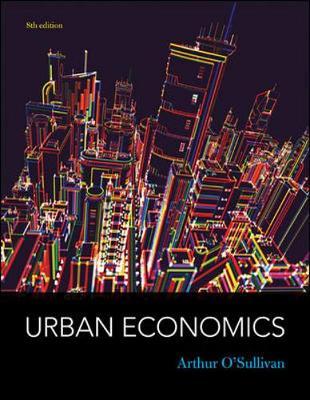Overview
Over the course of two decades, Urban Economics has achieved a worldwide audience, and has been translated into Chinese, Greek, Russia, and Korean. Like the seven previous editions, this edition provides a clear and concise presentation of the economic forces that: (a) cause the development of cities; (b) determine the spatial form of cities; (c) cause urban economies to grow or shrink; (d) generate urban problems such as poverty, crime, and congestion; (e) make the market for urban housing unique; and (f) shape the tax and spending policies of local government. In addition to developing the basic concepts of urban economics, the book uses economic analysis to evaluate the merits of policies designed to address our most vexing urban problems. The text is designed for use in undergraduate courses in urban economics andurban affairs. It could also be used for graduate courses in urban planning, publicpolicy, and public administration. All of the economic concepts used in the book arecovered in the typical intermediate microeconomics course, so students who havecompleted such a course will be able to move through the book at a rapid pace.
Full Product Details
Author: Arthur O'Sullivan
Publisher: McGraw-Hill Education - Europe
Imprint: McGraw-Hill Professional
Edition: 8th edition
Dimensions:
Width: 19.10cm
, Height: 2.50cm
, Length: 23.90cm
Weight: 0.957kg
ISBN: 9780073511474
ISBN 10: 0073511471
Pages: 528
Publication Date: 16 November 2011
Audience:
College/higher education
,
Tertiary & Higher Education
Format: Hardback
Publisher's Status: Out of Print
Availability: Awaiting stock

Author Information
ARTHUR O’SULLIVAN is a professor of Economics at Lewis and Clark College in Portland, Oregon. After receiving his B.S. degree in economics from the University of Oregon, he spent two years in the Peace Corps, working with city planners in the Philippines. He received his Ph.D. degree in economics from Princeton University in 1981 and taught at the University of California, Davis, and Oregon State University, winning teaching awards at both schools. He is the Robert B. Pamplin Junior Professor of Economics at Lewis and Clark College in Portland, Oregon, where he teaches microeconomics and urban economics. He is the coauthor of the introductory textbook, Economics: Principles and Tools, currently in its eighth edition. Professor O’Sullivan’s research explores economic issues concerning urban land use, environmental protection, and public policy. His articles appear in many economics journals, including Journal of Urban Economics, Regional Science and Urban Economics, Journal of Environmental Economics and Management, National Tax Journal, Journal of Public Economics, and Journal of Law and Economics.




